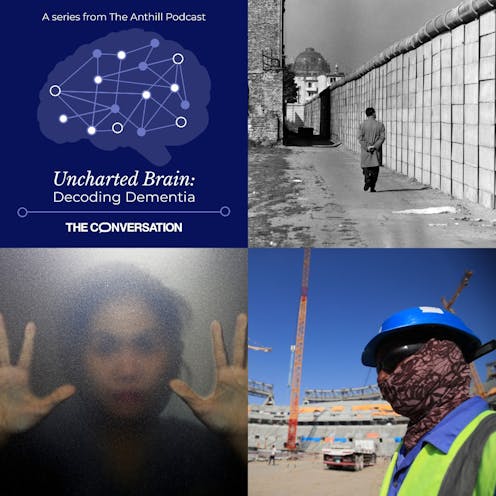
From toxic career rivalries and abandoned spies to the future of Africa’s lions and David Bowie’s environmental credentials, Insights long reads have covered them all in 2022.
In 44 long-form articles, as well as a number of related podcasts, our award-winning authors have put the spotlight on groundbreaking new research and compelling human interest stories from all over the world. Here are just some of the most memorable long reads of 2022, as chosen by Insights co-editors Paul Keaveny and Mike Herd.
Paul Keaveny
In November, Insights took a step into the world of podcasting with our Uncharted Brain: Decoding Dementia series. Each of the three podcast episodes was published alongside an article written by the experts at the centre of the research.
Read more: Uncharted Brain: Decoding Dementia – a three-part series to read and listen to
In the first, Marcus Richards and Jon Schott explained how a study which began just after the end of the second world war is still discovering clues about the causes of Alzheimer’s disease. A second gave emotional accounts of the personal toll of investigating the potential link between viruses and Alzheimer’s disease, and the impact on families of sport-induced traumatic brain injuries.

This article is part of Conversation Insights
The Insights team generates long-form journalism derived from interdisciplinary research. The team is working with academics from different backgrounds who have been engaged in projects aimed at tackling societal and scientific challenges.
At the start of 2022, we unearthed the backstory of one of the most important scientific and medical discoveries of the 20th century. Historian Kersten Hall examined the rivalry between the scientists who discovered insulin. They won a Nobel prize together but ended up hating each other’s guts.
Read more: The discovery of insulin: a story of monstrous egos and toxic rivalries
In John le Carré’s Tinker Tailor Soldier Spy, the owlish English spymaster George Smiley is asked: “Who can spy on the spies? Who can smell out the fox without running with him?” There can be very few people capable of putting up with the stress of life as a double agent – but that is exactly what “Agent M” did for 22 years, as he admitted to Netherlands-based academics Eleni Braat and Ben de Jong in a series of revealing interviews.
M operated for the Dutch security service and the CIA against the East German Stasi at the height of the cold war. At one terrifying point in 1985, he thought his cover had been blown as he was tied naked to a chair while guards screamed “traitor” at him. In the end, M was abandoned by the masters he had served so loyally for so long. His account is an attempt to make sense of “a life spent in the shadows”.
Read more: Revealed: untold story of the CIA/Stasi double agent abandoned after 22 years of service
We also continued our investigations into the role of UN missions, following up our exclusive report in 2019 which first revealed how children were being fathered and then abandoned by UN peacekeepers in Haiti, and which was widely covered by global media.
In August, researchers from the same team at the University of Birmingham exposed an even larger-scale scandal involving UN peacekeepers in the Democratic Republic of Congo. They stand accused of sexually abusing and exploiting women and children as young as ten – and in our story, some of the child victims of this abuse told their story for the first time. The research, which dates back to 2018, implicates UN personnel from 12 countries who held roles ranging from soldiers, officers and pilots to drivers, cooks, doctors and photographers.
Sometimes an Insights story can be a deeply personal exploration for the academic writing it, as their research and personal lives interweave. That was the case for Caitriona Beaumont, a professor of social history at London Southbank University. For her, the chance discovery of an old photograph uncovered her grandmother’s role in 19th-century Irish republicanism:
Here, in a grainy sepia image was my grandmother, in her early twenties, smiling directly at the camera. She is perched on a bicycle holding a fishing rod in one hand and a rifle in the other. The shock of seeing my maimeó, someone I had always associated with love and comfort, proudly brandishing a rifle and decked out in her Cumann na mBan (Women’s Council) uniform was profound. This wasn’t the grandmother I remembered.
Read more: How a photograph uncovered my grandmother's republican activism during the Irish revolution
Mike Herd
From the first discussion of a story idea right through to the moment of publication and beyond, collaborating with academics on an Insights long read is as thrilling as it is enlightening.
In March, we began hearing dramatic stories about entire Chinese cities going back into lockdown to resist a new wave of the COVID-19 virus. What was going on, and what would this mean not only for China but the wider world?
Fortunately, Jane Duckett, director of the Scottish Centre for China Research at the University of Glasgow, was on hand to explain – and less than two months later, we published a detailed account not only of what was happening on the ground in Shanghai and other cities, but why China would resolutely stick with its zero-COVID strategy for much of 2022, no matter how much damage it might do to both its people and economy.
Insights also travelled to many other corners of the world this year. We joined “digital nomads” in Thailand who, having long ago rejected the confines of the office, now want to replace the nation state altogether. Despite the idyllic images, our article revealed some hard realities about the challenges of this oh-so modern lifestyle.
We went deep underground in a lead-and-zinc mine in Kosovo to understand why we’re all complicit in the contradictions that mining brings to the surface along with all the materials our modern lives depend upon.
These are complicated stories to tell – perhaps none more so than the violent history of Masafer Yatta, where Palestinians continue to live in caves just as generations have done before them. Despite this, Israel has turned their homeland at the sourthern tip of the occupied West Bank into a military firing zone – our story meets some of those now facing eviction and the loss of their traditional livelihoods.
Our investigations have also looked at many of the supposed pillars of British society, including the charitable status of UK private schools and the “catastrophic” criminal justice system which, in recent years, has seen rape convictions drop to a historic low in England and Wales. Drawing on the experiences of serving police officers and crown prosecution lawyers as well as survivors of rape, we looked at every stage of a rape investigation, prosecution and trial to understand what’s going do desperately wrong.
The power of Insights comes from unearthing the stories of those who are rarely heard from, including authors telling difficult stories of their own. Our penultimate long read of the year, published on the eve of the first nursing strike in NHS history, movingly highlighted the emotional and physical toll of working as a nurse in an accident & emergency ward in the UK today. We look forward to highlighting many more such heartfelt accounts over the course of 2023.

For you: more from our Insights series:
The magic of touch: how deafblind people taught us to ‘see’ the world differently during COVID
Liverpool’s unsung COVID heroes: how the city’s arts scene became a life support network
To hear about new Insights articles, join the hundreds of thousands of people who value The Conversation’s evidence-based news. Subscribe to our newsletter.
This article was originally published on The Conversation. Read the original article.







